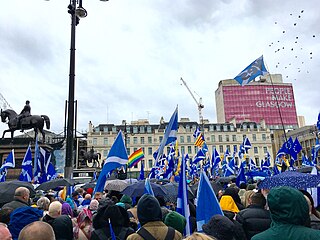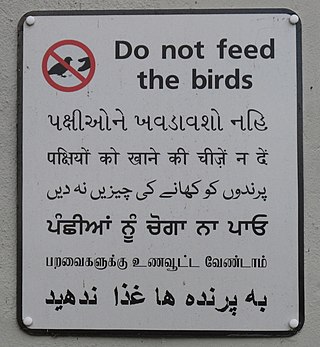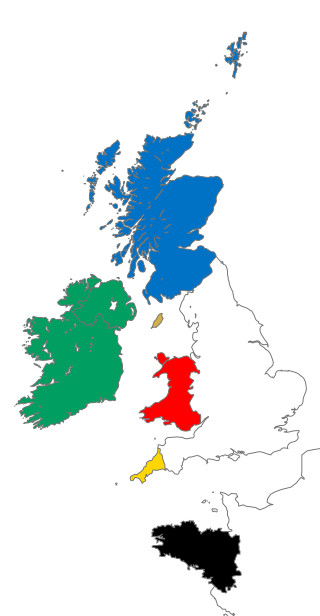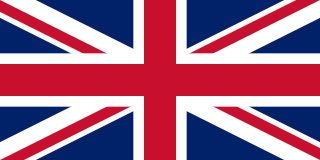Related Research Articles

Scotland is a country that is part of the United Kingdom. It contains nearly one-third of the United Kingdom's land area, consisting of the northern part of the island of Great Britain and more than 790 adjacent islands, principally in the archipelagos of the Hebrides and the Northern Isles. To the south-east, Scotland has its only land border, which is 96 miles (154 km) long and shared with England; the country is surrounded by the Atlantic Ocean to the north and west, the North Sea to the north-east and east, and the Irish Sea to the south. The population in 2022 was 5,436,600 and accounts for 8% of the population of the UK. Edinburgh is the capital and Glasgow is the largest of the cities of Scotland.

Scottish Gaelic, also known as Scots Gaelic or simply Gaelic, is a Goidelic language native to the Gaels of Scotland. As a Goidelic language, Scottish Gaelic, as well as both Irish and Manx, developed out of Old Irish. It became a distinct spoken language sometime in the 13th century in the Middle Irish period, although a common literary language was shared by the Gaels of both Ireland and Scotland until well into the 17th century. Most of modern Scotland was once Gaelic-speaking, as evidenced especially by Gaelic-language place names.

Ulster Scots or Ulster-Scots, also known as Ulster Scotch and Ullans, is the dialect of Scots spoken in parts of Ulster in Northern Ireland and the Republic of Ireland. It is generally considered a dialect or group of dialects of Scots, although groups such as the Ulster-Scots Language Society and Ulster-Scots Academy consider it a language in its own right, and the Ulster-Scots Agency and former Department of Culture, Arts and Leisure have used the term Ulster-Scots language.

Scottish independence is the idea of Scotland regaining its independence and once again becoming a sovereign state, independent from the United Kingdom. The term Scottish independence refers to the political movement that is campaigning to bring it about.

English, in various dialects, is the most widely spoken language of the United Kingdom, but a number of regional and migrant languages are also spoken. Regional indigenous languages are Scots and Ulster Scots and the Celtic languages, Irish, Scottish Gaelic, Welsh and, as a revived language with few speakers, Cornish. British Sign Language is also used. There are also many languages spoken by immigrants who arrived recently to the United Kingdom, mainly within inner city areas; these languages are mainly from continental Europe and South Asia.

Scottish national identity is a term referring to the sense of national identity, as embodied in the shared and characteristic culture, languages and traditions, of the Scottish people.

The culture of Scotland refers to the patterns of human activity and symbolism associated with Scotland and the Scottish people. The Scottish flag is blue with a white saltire, and represents the cross of Saint Andrew.
In the fields of cultural studies and social anthropology, cultural cringe is an internalized inferiority complex that causes the people of a country to dismiss their own culture as inferior (cringe-inducing) when compared to the cultures of other countries. In anthropology, cultural cringe is related to the concept of the colonial mentality, and usually is manifested in the anti-intellectualism deployed against intellectuals, scientists, and artists native to a colonized country or a former colony. Moreover, at the personal level, cultural cringe also is manifested as cultural alienation.

English nationalism is a nationalism that asserts that the English are a nation and promotes the cultural unity of English people. In a general sense, it comprises political and social movements and sentiment inspired by a love for English culture, language and history, and a sense of pride in England and the English people. English nationalists often see themselves as predominantly English rather than British.

British national identity is a term referring to the sense of national identity, as embodied in the shared and characteristic culture, languages and traditions, of the British people. It comprises the claimed qualities that bind and distinguish the British people and form the basis of their unity and identity, and the expressions of British culture—such as habits, behaviours, or symbols—that have a common, familiar or iconic quality readily identifiable with the United Kingdom. Dialogue about the legitimacy and authenticity of Britishness is intrinsically tied with power relations and politics; in terms of nationhood and belonging, expressing or recognising one's Britishness provokes a range of responses and attitudes, such as advocacy, indifference, or rejection.

The demography of Scotland includes all aspects of population, past and present, in the area that is now Scotland. Scotland had a population of 5,463,300 in 2019. The population growth rate in 2011 was estimated as 0.6% per annum according to the 2011 GROS Annual Review.

The Celtic nations or Celtic countries are a cultural area and collection of geographical regions in Northwestern Europe where the Celtic languages and cultural traits have survived. The term nation is used in its original sense to mean a people who share a common identity and culture and are identified with a traditional territory.
Anti-Scottish sentiment is disdain, discrimination, or hatred for Scotland, the Scots or Scottish culture. It may also include the persecution or oppression of the Scottish people as an ethnic group, or nation. It can also be referred to as Scotophobia or Albaphobia.

Since 1922, the United Kingdom has been made up of four countries: England, Scotland, Wales and Northern Ireland. The UK Prime Minister's website has used the phrase "countries within a country" to describe the United Kingdom. Some statistical summaries, such as those for the twelve NUTS 1 regions of the UK, refer to Northern Ireland, Scotland, and Wales as "regions". With regard to Northern Ireland, Scotland and Wales particularly, the descriptive name one uses "can be controversial, with the choice often revealing one's political preferences".

British people or Britons, also known colloquially as Brits, are the citizens of the United Kingdom, the British Overseas Territories, and the Crown dependencies. British nationality law governs modern British citizenship and nationality, which can be acquired, for instance, by descent from British nationals. When used in a historical context, "British" or "Britons" can refer to the Ancient Britons, the Celtic-speaking inhabitants of Great Britain during the Iron Age, whose descendants forming the major part of the modern Welsh people, Cornish people, Bretons and considerable proportions of English people. It also refers to citizens of the former British Empire, who settled in the country prior to 1973, and hold neither UK citizenship nor nationality.

The Scottish people or Scots are an ethnic group and nation native to Scotland. Historically, they emerged in the early Middle Ages from an amalgamation of two Celtic peoples, the Picts and Gaels, who founded the Kingdom of Scotland in the 9th century. In the following two centuries, Celtic-speaking Cumbrians of Strathclyde and Germanic-speaking Angles of Northumbria became part of Scotland. In the High Middle Ages, during the 12th-century Davidian Revolution, small numbers of Norman nobles migrated to the Lowlands. In the 13th century, the Norse-Gaels of the Western Isles became part of Scotland, followed by the Norse of the Northern Isles in the 15th century.
Yes Scotland was the organisation representing the parties, organisations, and individuals campaigning for a Yes vote in the 2014 Scottish independence referendum. It was launched on 25 May 2012 and dissolved in late 2014 after Scotland voted against independence.

English is by far the most spoken, and the "de facto" national language of Northern Ireland,; it occurs in various forms, including Ulster English and Hiberno-English. Irish is an official language of Northern Ireland since 2022, and the local variety of Scots, known as Ulster Scots, has official minority status, with services in the language provided by public authorities. Northern Ireland Sign Language and Irish Sign Language have also been recognised with minority status since 29 March 2004.

Cool Cymru was a Welsh cultural movement in music and independent film in the 1990s and 2000s, led by the popularity of bands such as Stereophonics, Gorky's Zygotic Mynci, Manic Street Preachers, Catatonia and Super Furry Animals.

The Identity and Language Act 2022 is an Act of the Parliament of the United Kingdom providing "official recognition of the status of the Irish language" in Northern Ireland, with Ulster Scots being an officially recognised minority language.
References
- ↑ "'I want to end the Scottish cringe'", BBC News, 28 February 2004. URL accessed on 10 June 2006.
- ↑ "Taking Scots beyond the 'cringe'", BBC News, 24 November 2003. URL accessed on 10 June 2006.
- ↑ We must shake off the Scottish cringe and win back our sporting pride", Scotsman.com, 27 March 2004. URL accessed on 10 June 2006.
- ↑ Unger, J. (2010) "Legitimating inaction: Differing identity constructions of the Scots language" in European Journal of Cultural Studies Volume 13:99-117
- ↑ "'I want to end the Scottish cringe'". BBC News Online . 28 February 2004. Retrieved 30 November 2016.